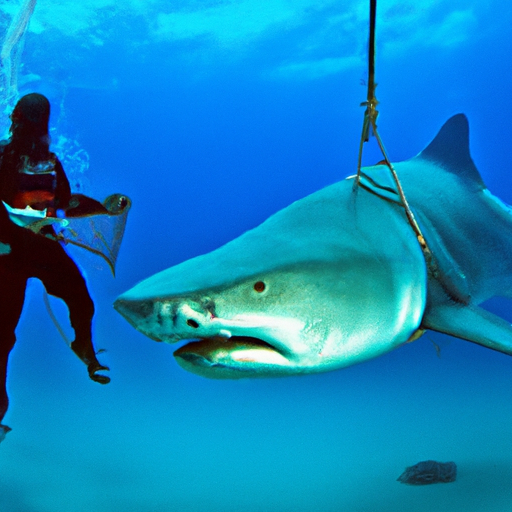Imagine embarking on a daring adventure, plunging into the depths of the ocean, coming face-to-face with the majestic creatures of the deep – sharks. But have you ever wondered just how deep these thrilling shark cage diving expeditions can take you? Well, wonder no more! With the help of “How Deep Is Shark Cage Diving?”, you’ll uncover the depths that these encounters can reach, immersing yourself in a world that combines both fear and awe in equal measure. Get ready to take the plunge and explore the secrets that lie beneath the surface of the water with this exhilarating product.
Benefits of Shark Cage Diving
Experience Close Encounters with Sharks
Shark cage diving offers a unique opportunity to get up close and personal with these magnificent creatures in their natural habitat. It allows you to witness their behavior, grace, and power firsthand, creating memories that will last a lifetime. Being inside a cage provides a sense of security while still allowing you to observe and appreciate the beauty and awe-inspiring presence of sharks.
Opportunity for Research and Conservation
Shark cage diving is not just an exciting adventure; it also contributes to research and conservation efforts. Many operators work closely with marine biologists and scientists to gather data and study shark behavior. By participating in these expeditions, you become an essential part of ongoing research projects that aim to protect and preserve these vital apex predators and their ecosystems. It’s a chance to make a meaningful impact while experiencing the thrill of being surrounded by these incredible animals.
Thrilling Adventure for Adrenaline Junkies
For adrenaline junkies and thrill-seekers, shark cage diving is the ultimate adventure. The adrenaline rush of being just inches away from these impressive creatures evokes a mix of fear, excitement, and pure exhilaration. It’s an experience that pushes you out of your comfort zone and allows you to conquer your fears while feeling the rush of adrenaline coursing through your veins. If you’re looking for an extraordinary and unforgettable adventure, shark cage diving is the perfect choice.
Popular Shark Cage Diving Destinations
South Africa
South Africa is renowned as one of the top destinations for shark cage diving. Locations such as Gansbaai, Mossel Bay, and Cape Town offer excellent opportunities to encounter various shark species, including the iconic Great White Shark. The warm waters and abundance of marine life in South Africa make it an ideal place for both experienced divers and beginners.
Australia
Australia is another popular destination for shark cage diving enthusiasts. Locations such as Port Lincoln in South Australia and Cairns in Queensland provide incredible opportunities to witness sharks in their natural habitat. From the massive Tiger Sharks of the Great Barrier Reef to the awe-inspiring Great White Sharks of Neptune Islands, Australia offers diverse and thrilling encounters with these magnificent creatures.
Mexico
Mexico offers exceptional shark cage diving experiences, particularly around Isla Guadalupe. This remote island in the Pacific Ocean is famous for its crystal-clear waters and is one of the best places in the world to dive with Great White Sharks. The chance to witness these powerful predators in such pristine surroundings is truly a once-in-a-lifetime experience.
Hawaii
Hawaii provides a unique shark cage diving experience, giving you the opportunity to encounter Galapagos Sharks and Sandbar Sharks. The warm waters, vibrant marine life, and breathtaking scenery make Hawaii an attractive destination for divers seeking a memorable shark diving adventure. From the island of Oahu to the stunning waters of Maui and the Big Island, Hawaii offers a range of shark diving experiences suitable for all levels of expertise.
Gansbaai, South Africa – The Great White Shark Capital
Gansbaai, located on the Western Cape of South Africa, is often referred to as the “Great White Shark Capital of the World.” This coastal town offers exceptional opportunities to observe and dive with Great White Sharks up close. The nutrient-rich waters attract a high concentration of these apex predators, making Gansbaai a must-visit destination for shark enthusiasts and nature lovers alike.

The Basics of Shark Cage Diving
Necessary Safety Precautions
Safety is of paramount importance when engaging in shark cage diving. Operators prioritize the safety of participants by implementing strict safety protocols, including rigorous cage construction, proper briefing and training, and clear communication between divers and crew members. Safety precautions such as wetsuit and weight belt requirements, as well as boat and cage maintenance, are taken to ensure a secure and enjoyable experience for all.
Duration and Cost
The duration of a shark cage diving excursion can vary depending on the location and operator. Typically, a trip can last anywhere from a few hours to a full day, including the time needed for briefing, boat transportation to the dive site, multiple cage dives, and opportunities for surface viewing. The cost of shark cage diving varies based on factors such as location, duration, and the number of dives. It is advisable to check with different operators to find a package that suits your preferences and budget.
Diving Procedures
Before embarking on a shark cage diving adventure, participants receive a comprehensive briefing on diving procedures. This includes information on how to enter and exit the cage safely, how to communicate with the crew, and what to expect during the dive. Operators typically provide detailed instructions on how to interact with the sharks, emphasizing the importance of respectful behavior towards these incredible creatures.
Essential Equipment
Operators usually provide all necessary equipment for shark cage diving, including wetsuits, masks, snorkels, and weight belts. Participants are advised to bring their swimwear, towel, and a change of clothes. Additionally, it is recommended to bring a waterproof camera or GoPro to capture the thrilling moments underwater. It’s essential to check with the operator beforehand to ensure you are fully prepared for the dive.
Certifications and Training
Shark cage diving does not require specific diving certifications or prior training, as it is accessible to both certified divers and non-divers. However, certain operators may require participants to have basic swimming skills and be in good physical health. Training specific to shark cage diving will be provided by the operator, ensuring that participants are well-prepared and comfortable before entering the water.
The Depths of Shark Cage Diving
Shark Population Depths
The depth at which sharks are found can vary depending on the species and the location. Some species, like the Great White Shark, are known to frequent shallower waters near coastlines, while others, such as the Whale Shark, are commonly encountered in deeper offshore areas. Understanding the preferred habitats and habits of different shark species can help determine the appropriate diving locations for shark cage diving.
Typical Cage Diving Depths
Shark cage diving can take place at various depths, ranging from shallow waters near the surface to deeper locations. The depth at which the cage is submerged is carefully chosen to ensure optimal visibility and proximity to the sharks. Although specific depths can vary depending on the site and operator, it is common for cages to be positioned at depths of around 10 to 30 feet (3 to 9 meters) beneath the surface.
Factors Influencing Depth
Several factors influence the choice of diving depths for shark cage diving. These include the type of shark species present, water visibility conditions, regulatory and safety considerations, and the preferences and expertise of the operator. While some operators may opt for shallower depths to provide a more intimate and clear encounter with the sharks, others may choose deeper depths to accommodate the behavior and movements of specific shark species.
Visibility Conditions
Water visibility can greatly impact the overall experience of shark cage diving. Operators aim to select dive sites with good visibility, allowing participants to have clear views of the sharks and their surroundings. Factors such as weather, currents, and water clarity can affect visibility conditions. While operators cannot control natural variables, they carefully assess the visibility conditions before each dive to ensure the best possible experience for participants.

Safety Measures in Shark Cage Diving
Reinforced Dive Cages
The safety of participants is a top priority in shark cage diving. Dive cages are designed and constructed to withstand the force and impact of sharks, providing a secure barrier between humans and the animals. These cages are often made of sturdy materials such as steel or reinforced PVC, ensuring they can withstand the immense strength and curiosity of sharks. It is important to choose reputable operators that adhere to strict cage construction standards.
Qualified Dive Masters
Operators employ qualified dive masters who are trained to lead and supervise shark cage diving expeditions. These professionals have extensive knowledge of shark behavior, diving techniques, and safety protocols. Dive masters are responsible for briefing participants, conducting in-water supervision, and ensuring the overall safety and enjoyment of the dive. Their expertise and experience contribute to a safe and well-managed shark cage diving experience.
Strict Operational Guidelines
Operators follow strict operational guidelines to ensure the safety of both participants and sharks. These guidelines may include restrictions on the number of divers in the cage, time limits for each dive, and specific protocols for entering and exiting the water. Additionally, operators collaborate with local authorities and marine conservation organizations to ensure compliance with relevant regulations and ethical practices.
Emergency Procedures
Well-prepared operators have clearly established emergency procedures in place to handle any unforeseen circumstances during shark cage diving. These procedures may include protocols for medical emergencies, equipment malfunctions, or unexpected shark behavior. It is essential for participants to listen carefully to the briefing provided by dive masters regarding emergency procedures and to follow their instructions in the event of an emergency.
Cage Design and Construction
The design and construction of shark cages are integral to ensuring the safety of participants. Cages are built with durable materials and reinforced frames to withstand the pressure and impact of sharks. Mesh openings and bars are carefully designed to prevent any part of the diver’s body from extending beyond the cage. The sturdiness and reliability of the cage structure contribute to a secure and enjoyable shark cage diving experience.
Environmental Impact and Concerns
Minimizing Disturbance to Sharks
Responsible shark cage diving operators are committed to minimizing disturbance to sharks and their natural behavior. They aim to provide sustainable and respectful encounters that prioritize the well-being of the sharks. Operators enforce strict rules regarding appropriate behavior and interaction with the sharks, such as not touching, provoking, or feeding them. By following these guidelines, participants can enjoy their experience while ensuring minimal impact on the sharks’ natural habitat.
Code of Conduct for Shark Cage Diving
To mitigate any negative environmental impact, industry organizations have developed codes of conduct for shark cage diving operations. These codes outline guidelines for safe and responsible practices, including maintaining distance from sharks, using eco-friendly products, and respecting the marine environment. Operators are encouraged to adhere to these codes to ensure sustainable and ethical shark cage diving practices.
Impacts on Shark Behavior
Shark cage diving has been the subject of scientific studies examining its potential effects on shark behavior. While research is ongoing, there is evidence to suggest that repeated exposure to cage diving can influence certain aspects of shark behavior, such as habituation to human presence and changes in feeding patterns. However, these impacts are generally considered minimal compared to other human activities that directly harm shark populations, such as overfishing and habitat destruction.
Impacts on the Marine Ecosystem
Shark cage diving, when conducted responsibly, has been shown to have minimal negative impact on the overall marine ecosystem. Unlike traditional fishing practices that directly target and deplete shark populations, shark cage diving promotes shark conservation and contributes to the local economy through eco-tourism. By supporting responsible operators and adhering to ethical practices, participants can help protect sharks and their ecosystems for future generations.

Legal Regulations and Protection
Licensing and Permits
Shark cage diving operations are subject to licensing and permit requirements imposed by local authorities. These regulations aim to ensure the safety of participants, protect the environment, and promote sustainable practices. Operators must obtain the necessary licenses and permits to operate legally, demonstrating compliance with specific criteria and guidelines set by regulatory bodies.
Protected Shark Species
Many countries have implemented laws and regulations to protect certain shark species from overfishing and exploitation. It is important for operators and participants to familiarize themselves with these protected species and adhere to the guidelines in order to contribute to their conservation. By respecting these regulations, shark cage diving can make a positive contribution to the preservation of vulnerable shark populations.
Government Guidelines
Government agencies responsible for marine conservation and tourism often provide guidelines and recommendations for shark cage diving operations. These guidelines may cover aspects such as safety protocols, environmental protection, and codes of conduct. Operators are expected to follow these guidelines to maintain high standards and promote responsible and sustainable shark cage diving practices.
Conservation Initiatives
Shark cage diving has become increasingly linked to conservation initiatives and efforts. Many operators actively support research projects, conservation programs, and advocacy campaigns focused on protecting sharks and their ecosystems. By participating in shark cage diving experiences, individuals contribute directly to these conservation initiatives, helping to raise awareness and funding for the preservation of these essential apex predators.
Tips for an Unforgettable Shark Cage Diving Experience
Choose the Right Operator
Research and choose a reputable operator with a strong commitment to safety, environmental sustainability, and responsible shark cage diving practices. Read reviews, check certifications, and seek recommendations from experienced divers to ensure you have a memorable and enjoyable experience.
Booking in Advance
Shark cage diving experiences are often in high demand, especially in popular destinations. To secure your spot and ensure availability, it is advisable to book in advance. This allows you to plan your trip accordingly and avoid disappointment due to limited availability.
Prepare Physically and Mentally
Shark cage diving can be physically and mentally demanding. Ensure you are in good health and have a reasonable level of fitness to handle the challenges of the dive. Familiarize yourself with the experience and potential risks to mentally prepare yourself before the adventure.
Pack Appropriately
Pack essential items such as swimwear, a towel, sunscreen, and a change of clothes. Check with the operator regarding other equipment they provide, such as wetsuits and masks. Consider bringing a waterproof camera to capture the incredible moments underwater.
Understand the Activity Risks
Like any adventure activity, shark cage diving carries inherent risks. It is important to understand and accept these risks before participating. Listen attentively to the briefing provided by dive masters, follow instructions carefully, and communicate any concerns or questions you may have.

Challenges and Controversies in Shark Cage Diving
Animal Rights Concerns
Shark cage diving raises concerns among animal rights activists, who argue that it may disrupt natural shark behavior and encourage the commodification of animals for tourism. Critics argue that these activities may exploit sharks for human entertainment and profit. To address these concerns, responsible operators prioritize the well-being of sharks and ensure that interactions are conducted in a respectful and sustainable manner.
Ethical Considerations
Ethical considerations surrounding shark cage diving relate to the potential impacts on the sharks themselves and the broader marine ecosystem. While studies suggest minimal disruption to sharks, ongoing research is necessary to further evaluate any potential long-term effects. The industry continues to evolve, with operators and researchers working together to develop best practices that prioritize the conservation and protection of sharks.
Local Community Impact
The growth of shark cage diving has had both positive and negative impacts on local communities. On one hand, it has provided economic opportunities for coastal towns, supporting local businesses and creating jobs. On the other hand, concerns have been raised about over-tourism, cultural appropriation, and the potential displacement of local fishing activities. Striking a balance between tourism development and community concerns is crucial for the sustainable growth of shark cage diving destinations.
Over-Tourism Issues
Popular shark cage diving destinations can experience issues related to over-tourism. Increased visitor numbers can put pressure on the environment, disrupt natural ecosystems, and compromise the quality of the experience. It is essential for operators and local authorities to implement sustainable tourism practices, such as visitor limits and strict regulations, to mitigate the potential negative impacts of over-tourism and maintain the long-term viability of shark cage diving.
Conclusion
Shark cage diving offers a thrilling and awe-inspiring adventure for both seasoned divers and those new to the underwater world. Beyond the adrenaline rush and close encounters with sharks, this activity provides valuable opportunities for research, conservation, and education. By choosing responsible operators, adhering to safety protocols, and respecting the marine environment, you can contribute to the preservation of these magnificent creatures and their ecosystems. With careful consideration of potential issues and controversies, shark cage diving can be a truly unforgettable experience that fosters a deeper appreciation for the beauty and importance of sharks in our oceans.

- Can You Dive With Sharks In California? - August 19, 2023
- What Are The Rules Of Shark Cage Diving? - August 19, 2023
- Where In Florida Can You Dive With Sharks? - August 19, 2023








